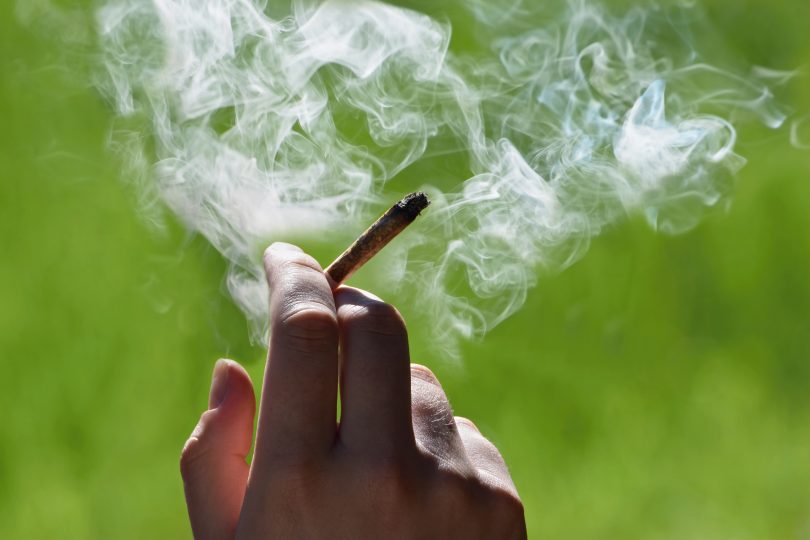On the surface it may seem that the world has finally grown to accept cannabis – the plant, the users, and the culture. Laws on the subject are relaxing, legal markets are becoming increasingly common, and high-end, lab-tested products are available with a simple click of a button. One thing that’s proving more difficult to shake is the stigma that has been a dark cloud over cannabis use for decades. Where did these ideas originate and why are they so hard to break away from?
I enjoy smoking weed outside. I come from a rural area where I had a large, very private backyard, friendly progressive neighbors, and smoking around my property was just something I did without giving any thought to it. I recently sold my home and have been temporarily living in a more condensed “suburbia” type of neighborhood for the last few months.
Here, weed is NOT ok.
Trying to be somewhat discreet, I’ve been sticking to quietly smoking in my garage while keeping an eye on my oldest son as he plays with the other kids in the neighborhood. One afternoon, one of my son’s friends approached me in the garage (my garage) and said, “oh, you’re smoking that stuff again… my mom said I’m not allowed to smell it.” And unfortunately, that’s not the only comment I’ve heard, but that’s one of the statements that sticks out most to me.
So clearly, my cannabis habits are being discussed among the other parents; and clearly, they don’t approve. It’s worth mentioning that block parties with drinking are a semi-regular thing but a measly bud has everyone up in arms. It honestly baffles my mind, but as all the neighbors continue to rally against my pot use, it has shed a light on how many people still hold on to these negative views about cannabis and how deeply engrained this stigma remains in our society.
If you’re a cannabis aficionado who would like to learn more about this incredible plant, as well as gain access to exclusive deals on flowers and other products, then make sure to subscribe to The Delta 8 Weekly Newsletter
The US and Its Complicated History with Cannabis
Cannabis and other psychedelic plants have been used therapeutically in Eastern traditional medicine for centuries and its use has been noted in numerous different countries and continents throughout history. Even in the United States, the value of cannabis as a healing plant was known far and wide.
Back then, Eli Lilly, Bristol-Meyer’s Squib, and other major pharmaceutical brands were using cannabis extracts, sometimes even whole plant matter, in their formulations. A New York Times article from 1876 even cites the use of cannabis to cure a condition referred to back then as “dropsy”, which was swelling in the soft tissues from an accumulation of fluid in the body. Today this would be known as edema.
Before 1910, the word “marijuana” did not even exist in American culture. It was known by its scientific name because recreational use was not very widespread at the time. Following a wave of LEGAL immigration in the early 1900s, the idea of recreational cannabis use was on the rise. The government used that as a scapegoat to push ridiculous cannabis regulations, but it’s one of those situations where it really is hard to determine cause and effect: was the uptick in cannabis use caused by the new citizens and population growth, or where these two events completely unrelated and just occurring at the same time? Cannabis was nothing new and increased curiosity and use seemed inevitable.
Regardless, once the government realized people were using cannabis for fun and not just to treat chronic illnesses, the war on weed began. A familiar name in modern cannabis history is Harry Anslinger, the first commissioner of the Federal Bureau of Narcotics. When he got appointed is when the word “marijuana” start making the headlines and the word “cannabis” became of thing of the past. It really shows how powerful is the parallel between language and public opinion.
Although “cannabis” was a medicinal plant that was relatively well-known in the United States, “marijuana” (spelled “marihuana” at the time) was seen as a dangerous drug that creeped in the shadows of America’s counterculture. Many point to the fact that without his fabricated war on “drugs”, Anslinger would have had nothing to do and inevitably lost his position. So he took some disturbingly racist ideologies, a lot of fear mongering, and a touch of hardcore conservativism and weaved together what would end up being a decades long campaign against a harmless plant and many innocent people.
Public Perception Framing the Legal Landscape
Among one of Anslinger’s most powerful weapons was his manipulation of the media and understanding of public perception. On the milder end of things, he was perpetuating the negative cannabis stereotypes we still hear today: marijuana users are lazy, unmotivated, unintelligent, reckless, thoughtless, dangerous, low-lives, etc.
On the more extreme side of the spectrum, he insisted that cannabis use led to “insanity, criminality, and death,” and that “smoking marihuana cigarettes for a month” would cause a completely normal person’s brain “to be nothing but a storehouse of horrid specters.” He added that “Hasheesh makes a murderer who kills for the love of killing out of the mildest mannered man who ever laughed at the idea that any habit could ever get him” Yes, he was very dramatic, but that proved to be incredibly effective.
In 1936, an infamous propaganda film called Reefer Madness hit the screens. In the movie, teenagers try smoking weed for their first time and their night spirals into a series of horrific events such as disturbing hallucinations, attempted rape, and ultimately, murder. The movie was right in line with what Anslinger had been babbling about and people were terrifying that “marihuana” was going to corrupt their youth.
Cannabis quickly became public enemy number one and we’ve been fighting the negative reputation ever since. Only in the last few years have we seen decades of activism come to fruition with more mainstream recognition and legal leniency. That said, we’re still a long way from where we need to be, and much of the roadblocks have been a direct result of the existing cannabis stigma.
Because of the way cannabis is viewed, it has always been difficult to pass any kind of progressive legislation which means research efforts are hindered, an outrageous number of citizens have criminal charges for cannabis possession, and in general, people suffer because of these outdated attitudes.
Stigmatized Socially
Cannabis users have reported “stigma” in the form of discrimination, rejection, and judgement in many different social contexts and from many different types of people. Most commonly, it’s experienced in the workplace, housing, and travel. For example, it is well-known that most jobs drug test all potential hirees and cannabis is usually a disqualifying factor. Not only that, but cannabis stays in the system longer than other substances – 15+ days for cannabis and only 2-3 days for drugs like meth and heroin – so it’s more likely that a cannabis user would fail an employment drug screen than a user of harder drugs.
In housing, we face unique issues as well. When you rent a home or apartment, there are often stipulations in the rental agreement regarding smoking. Typically, if you’re found to be smoking then you’ll need to pay an extra cleaning fee when you move out. Sometimes, it’s small and insignificant, but other times the fee is rather exorbitant and in some extreme cases, the person could be kicked out of their home for breach of contract.
The obvious issue here is people who smoke cannabis for wellness reasons are still on the hook financially, even if they can provide a medical recommendation. The same thing happens at hotels, air bnbs, and other short-term lodging facilities which can make travelling a seriously daunting task for a medicinal cannabis user.
Researchers from the University of Amsterdam recently set out to understand this phenomenon even better by comparing seven European countries to see if the stigma was higher in areas where cannabis was more strictly criminalized. The results, which found a definitive link between criminality and stigma, were published in the European Journal of Criminology. Although the study was conducted overseas, the same principal applies here in the states. In a state like California or Colorado, you’re more likely to find a larger number of people who are not only accepting of, but open and transparent about cannabis use than you would in a state like Alabama or Mississippi. I personally was much more discreet about my pot smoking when I lived in Indiana then I am here in California.
This all makes sense considered that cannabis stigma only became a thing when public views and laws began to regress. Remember, less than a couple hundred years ago cannabis was a widely accepted, easily accessible, and heavily utilized herbal remedy… but by the early 1900s anti-cannabis campaigns were in full force, filling people’s minds with misinformation and fear. In this new age, cannabis was a threat, it had no medicinal value, and stigmatization of cannabis users became the societal norm.
Stigmatized Medically
Medical stigma is real, and it’s dangerous. Stigma and discrimination in healthcare is well documented and it has a profound impact the treatment and health outcomes of patients who experience it. Examples of this can include making people wait longer for care, passing off their care to junior colleagues or students, outright denial of care, threats of legal action, or even verbal and physical abuse. The fear of being judged can make people completely avoid much needed medical procedures and put them in possibly life-threatening situations.
For instance, take a woman who is using cannabis to minimize her anxiety while dealing with some mild postpartum depression. To me, that seems perfectly reasonable, normal, and even responsible since I view cannabis as being much safer than prescription medication. But a medical doctor would likely feel different, urging her to switch from cannabis to some type of antidepressant and mandating drug tests to make sure she stops smoking weed.
If she fails the next drug test, she will be threatened with legal action and might even lose custody of her child, and from that point it can take years (if ever) to regain control of her life. Knowing all this, it’s more likely that this hypothetical woman will avoid talking to a healthcare professional at all. In this circumstance, and in a perfect world where cannabis research was more widely accepted, a combination of therapy and cannabis treatment would probably be the perfect remedy; but in a world of politicized healthcare, what is best for us takes backseat to what is most profitable.
A Canadian study surveyed twenty-three individuals who use cannabis therapeutically for a wide range of health problems, to determine how the stigma affects their treatment and daily lives, as well as see what they do to manage it. Some people have been denied other medications based on their cannabis use, been intimidated by their doctors, had to pass up certain jobs, some have lost friends and relatives stopped talking to them.
The most common strategy for minimizing these issues was to be more secretive about their cannabis use. But stop and think for a minute how ridiculous that sounds. Would someone taking heart medications, or something for high cholesterol or blood pressure have to hide their health condition to avoid being judged? Do diabetics have to hide in their car to check their glucose levels for fear of being fired if anyone finds out they have a chronic disease? So why is this a problem for people medicating with cannabis?
How to Be Part of the Change
Talk more! Be loud and unashamed of your cannabis use. Be part of the movement that pushes cannabis forward. Often, the people who are least vocal about it are the ones who would do the most to shatter these preconceived notions that people have. The quiet biology teacher that goes home and smokes a joint to unwind from dealing with other people’s teenagers day after day. The firefighter who likes to munch on some edibles after a 72-hour shift. The old combat veteran down the street that hates taking 12 pills a day and chooses to light up instead.
It won’t always be the in-your-face, cannabis activist types that make waves in politics… that has to be a combined effort of everyone who has the privilege of utilizing the cannabis plant’s undeniable benefits. Together is the only way we will move past cannabis stigma.









